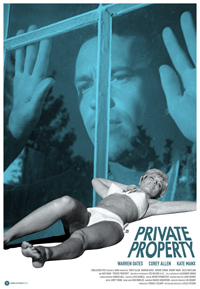Piece of the Pie: Stevens’ Psychosexual Drama Gets Revamped
 The poster tagline for Leslie Stevens’ 1960 directorial debut Private Property says it all, proclaiming the film to be “the boldest story of a planned seduction ever to scald the screen!” the statement hovering above the strangely positioned, free-floating figure of lead actress Kate Manx (wife of the director), derriere exposed. Planned seduction, as we come to find, is more along the lines of nonconsensual sex (you know, rape), and Stevens’ Los Angeles set potboiler is a sweaty three hander landing somewhere along the left side of noir. Long thought forgotten, the film has been restored courtesy of Cinelicious Pics due to interest in the film’s most notable cast member, Warren Oates, who plays one of a pair of young-ish thugs who menace gas station attendant before trailing a trophy wife to her isolated mansion and attempting to play some funny games with her. A bit too obvious (as well as uncomfortably sleazy) with its proclamations on class and its handling of gender stereotypes, it’s offbeat enough to generate interest in peculiar retro items.
The poster tagline for Leslie Stevens’ 1960 directorial debut Private Property says it all, proclaiming the film to be “the boldest story of a planned seduction ever to scald the screen!” the statement hovering above the strangely positioned, free-floating figure of lead actress Kate Manx (wife of the director), derriere exposed. Planned seduction, as we come to find, is more along the lines of nonconsensual sex (you know, rape), and Stevens’ Los Angeles set potboiler is a sweaty three hander landing somewhere along the left side of noir. Long thought forgotten, the film has been restored courtesy of Cinelicious Pics due to interest in the film’s most notable cast member, Warren Oates, who plays one of a pair of young-ish thugs who menace gas station attendant before trailing a trophy wife to her isolated mansion and attempting to play some funny games with her. A bit too obvious (as well as uncomfortably sleazy) with its proclamations on class and its handling of gender stereotypes, it’s offbeat enough to generate interest in peculiar retro items.
Duke (Corey Allen) and Boots (Warren Oates) are two drifters who arrive at a roadside gas station in Southern California looking for free handouts. Immediately distracted by a beautiful blonde (Kate Manx) who pulls into for gas, the duo is determined to follow her, hitching a ride with another customer and tracking her to an isolated Los Angeles estate. Luckily, her neighbors are out of town, so they take over a bungalow and spy on her, observing her at the pool side with a distracted husband. When he leaves, Duke decides to approach their home and eventually seduce the woman before allowing Boots access to her as well.
Private Property plays like a lot of dog-eared obscure titles from the sixties, films directed by visionaries without budgets starring cast members before they became notable. The film’s cheapness and familiar Los Angeles setting feel similar to Brian G. Hutton’s 1965 road film Wild Seed, in which Michael Parks stars as a young Los Angeleno drifter who hooks up with a seventeen year old girl. Stevens’ film begins like a classic noir, with two sinister men suddenly appearing at a desolate gas station right outside of Malibu attempting to shake down the owner before something more interesting comes along. Both Allen and Oates seem a bit too gone to seed to be acting like juvenile delinquents looking to play rebel rebel, and their immediate dysfunction promises unpleasant psychosexual behaviors. Things get creepy real quick when we learn Boots is technically a virgin and is apparently scared of women, which has Duke determined to procure sex for his emasculated pal. Kate Manx (who looks a lot like Jessica Biel) is the more interesting something, arriving to fill up her husband’s sports car in the only sequence where she’s outside of her palatial estate and granted a hint of agency. Hitching a ride, a telling conversation with their white driver explains to the men why they can never be with a woman like Manx’s wealthy blonde. “You can’t mix the groups,” arguing different classes of humans are like different species of animals.
Stevens, who is perhaps best remembered for his television output, or the bizarre William Shatner headliner Incubus (1966), filmed entirely in Esperanto, would cast Manx in his 1962 follow-up, Hero’s Island before they divorced. These would be her only film appearances thanks to an unfortunately tragic end in 1964 following an overdose. Her characterization plays a bit problematically, the film requiring her to be a sympathetic victim, though her obviously repressed desires aren’t afforded the same freedom of expression (hardly a surprise for the period). Instead, she languishes in banality. “I swam back and forth ten times today,” she informs her bored husband, who arrives to visit her as if she were a captive in his expansive compound. Once Allen inserts himself (looking for the Hitchcock residence) to engage his ‘planned seduction,’ Oates rarely factors into the film at all, and instead a bit of campy repartee and increasing innuendo transpires as Allen pretends to be an out of work gardener who schools her on the male and female olive trees and how they, you know, interact. “I’m what you call a physical type,” he leers. Off-putting, but not nearly as strange or subversive as it sounds, Private Property’s lean narrative conjures a passing interest.
★★½/☆☆☆☆☆


